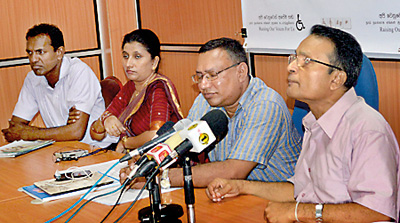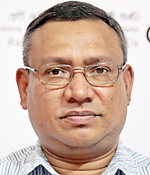News
Handicapped electors decide to make their own voices heard at Parliamentary election
View(s):Shunned, isolated and marginalised, they have mostly been given a deaf ear or a blind eye and not accorded their rightful place in society. Having come to the sad conclusion that enough is enough, they have now decided to take not only their future into their own hands but also their troubles and demands to a different level, creating history.

Four stalwarts of ‘Raising our voices for us’ brief the media on their plan of action on July 23. From left are the national campaigner for the deaf and hearing-impaired, K.K. Brian Susantha; national campaigner for women with disabilities, Manique Gunaratne; National Convener Prasanna Kuruppu; and national campaigner for those with physical disabilities, Dr. Ajith C.S. Perera.. Pix by M.A. Pushpa Kumara
Uniting under the banner of ‘Raising our voices for us’ (Api venuwen apeyma handa), two Independent groups are set to contest the Parliamentary election on August 17, with the distinction from others being that all candidates are those with disabilities.
The Colombo and Gampaha Districts will for the first time in Sri Lanka’s electoral history see the two lists under the symbols of the computer and the nalawa being displayed at polling booths. While 22 members will contest the poll under Independent Group No. 12 in Colombo, 21 will do so under Independent Group No. 15 in Gampaha.
“It’s a trial,” says Prasanna Rajiv Kuruppu , Convener of ‘Raising our voices for us’, pointing out that according to the 2011 Census there are 1.6 million (8.7%) persons in Sri Lanka over the age of five who have a disability. “We, however, believe that the numbers with a disability are more, around 2.5 million (12.5%) of the population.”
As the count-down to the election begins with just 15 more days, there will be no banners, cut-outs and vehicles plastered with candidate propaganda, he says, pointing out it is hoped to mobilise support through social media and a few advertisements in the newspapers for which they are looking for sponsors. (See box for his profile)
“We have a nice composition,” stresses Mr. Kuruppu, explaining that not only the four main groups in the ‘disability sector’ are represented but there are also many women contestants. While he is the Convener/Leader of both teams from Colombo and Gampaha and will be contesting from the Gampaha District as its leader there, the four groups with disabilities include:
• Physical disabilities which include those with one or more limb amputations, polio, paralysis, paraplegia and quadriplegia. These people with disabilities are estimated to comprise about 45% of the total disabled population. The national campaigner for this group is Dr. Ajith C.S. Perera who is contesting from the Colombo District.
- •Blind & visually-impaired — The national campaigner and Colombo group leader is W.M.D. Rathnasekara who is contesting from the Colombo District.
- Deaf & hearing-impaired — The national campaigner is K.K. Brian Susantha who is contesting from the Colombo District.
- Parents of intellectually-disabled children and youth – The national campaigner is Nihal Nanayakkara. He, however, is not contesting the election.
In a unique move, ‘Raising our voices for us’ also has a national campaign for women with disabilities, spearheaded by well-known disability rights activist Manique Gunaratne who is Senior Trainer at the ICT Training Centre of the Employers’ Federation of Ceylon, even though she is not contesting the election, the Sunday Times learns.
Explaining that a set of like-minded people with disabilities decided that it was time to stop sending proxies to Parliament those who were not sensitised to the numerous difficulties faced by them, Mr. Kuruppu says that the disabled wish to have equal rights and an equal voice.“Before this we have had to go before politicians to plead for this or that, like a ‘vote-making’ mechanism. We, however, feel that to win the rights of people with disabilities, a blind person, a deaf person and a person in a wheelchair being in Parliament would make a huge difference,” says Mr. Kuruppu.
This is the best way to get national leaders to make the changes we need, he says.Dubbing Sri Lanka a “dualist” country, he explains that many laws are in place with regard to people with disabilities. But this is a mirage that is shown to the world, for the reality is different. The laws are there on paper but implementation has not taken off. An example cited by Mr. Kuruppu is Sri Lanka being among the first eight countries to be signatories to the International Convention for the Rights of Persons with Disabilities on March 30, 2007, at the United Nations in New York, but even eight years later there has been no ratification. There are laws in place but they simply have no teeth, he laments, pointing out that even in Parliament people with disabilities have no proper accessibility. “Parliamentarians need to stay in a wheelchair for just a day to realise the frustration of those who have to live all their lives in wheelchairs where the physical environment is not conducive.”
According to him the basic is accessibility in the physical environment and those who need these facilities encompass a large group including children, youth, women and elderly. A forgotten group is women who are expecting babies, who sometimes have to take a toddler along with them when they have to attend to work especially in a government office.
Writing letters, lobbying and advocacy, measures resorted to over the years have proved futile, says Mr. Kuruppu, adding that this is the very reason it has been vital to take the grievances before the people, to gain representation in Parliament.
‘Raising our voices for us’ is going to the polls seeking inclusion in the mainstream which should mandatorily be on the foundation of equal opportunity and equal participation.
The day his life changed  National Convener Prasanna Kuruppu The road has been long and tortuous for the Convener of ‘Raising our voices for us’, Prasanna Kuruppu. Fifty-year-old Mr. Kuruppu recalls with poignancy, the day that his life changed forever and the events leading up to Eelam II. Serving as the Administrative and Accounts Officer at Palali, Mr. Kuruppu went to the front when the ground defence personnel of Palali were hit badly by the LTTE attack on June 14. “We began operations on June 20, along with the Army, to clear the runway as no aircraft could land or take-off, as the LTTE had bunkered down at a distance and was launching attacks,” he says. It was just as he was about to fire a rocket-propelled grenade at the LTTE bunker when an LTTE mortar landed between him and his buddy, killing his buddy on the spot. The rest are only painful memories sans both his legs. Staying on in the Air Force until 2000 when he retired, he had later worked in the private sector for three years before joining the International Campaign to Ban Landmines, getting exposure on the international scene. Many are the organisations for people with disabilities that he has worked for and held office. Currently he is an Advisory Board member of the Disability Organisations’ Joint Front and member of the Sri Lanka Foundation for the Rehabilitation of the Disabled. | |
| Manifesto highlights The highlights of the manifesto of ‘Raising our voices for us’ include: • Education – Speedy reforms in primary and secondary inclusive education for children with special needs and introduction of new technologies and alternative teaching and learning methodologies. Allocation of at least 5% from the National Education Budget for inclusive education and special needs education reforms. • Health & rehabilitation – Introduction of a National Injuries Surveillance and Referral System, with periodic and systematic post-reviews as well as a National Healthcare Security System; setting minimum national standards in the manufacture and importation of devices used by the disabled; and standardisation of the service provided by helpers and caregivers. • Work & employment – Review of the circular providing for a 3% quota for the disabled when recruiting for the State sector and provision of tax concessions to private and corporate sector employers who provide disability-friendly workplaces. • Enabling access to the physical environment – Full and effective implementation of the Disabled Persons (Accessibility) Regulation No. 01 of 2006 and setting up a National Monitoring Mechanism to review the implementation of the regulation at national, district and divisional levels. • Care and rehabilitation of injured service personnel and other victims of the armed conflict – Setting up of a national policy/mechanism to periodically review service personnel who have been released on combat casualty status and provide, when necessary, devices if required; setting up of a mechanism for the care and rehabilitation of combat casualties through home-visits, rather than making the disabled persons seek out such services; effect the promotions of such service personnel released on combat casualty status prior to 2006 and streamline salary and pension anomalies and settlement of arrears without delay; and identify those who have become permanently disabled due to the conflict (civilians, ex-combatants etc.,) and initiate a national mechanism to review them periodically. • Common interventions – Parliamentary approval for the Disability Rights Bill 2014 and setting up a Disability Trust Fund with a minimum of Rs. 500 million provided by the national budget annually. | |

